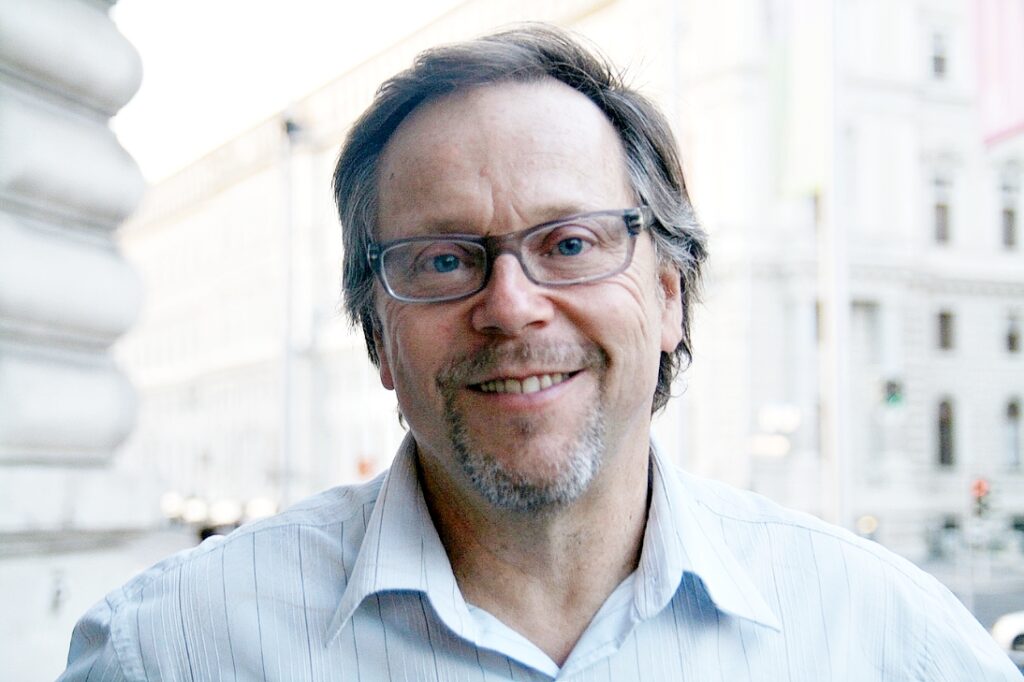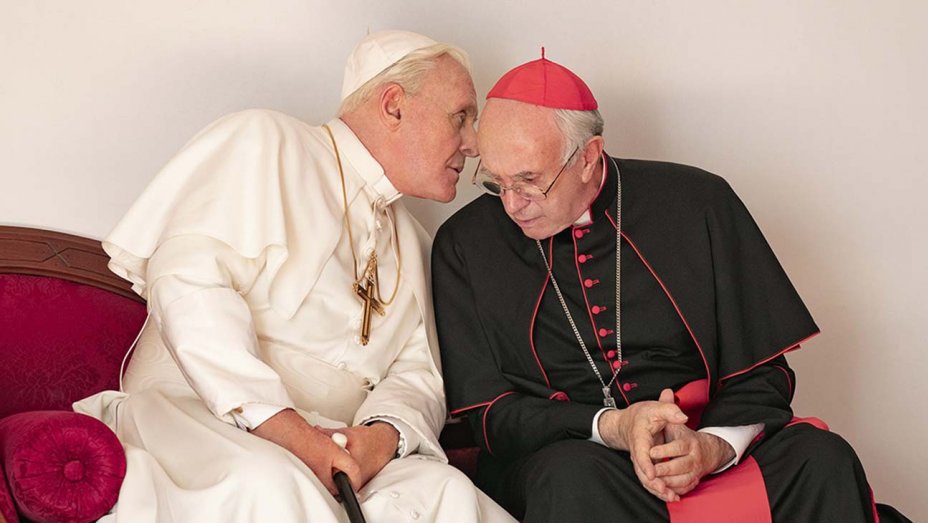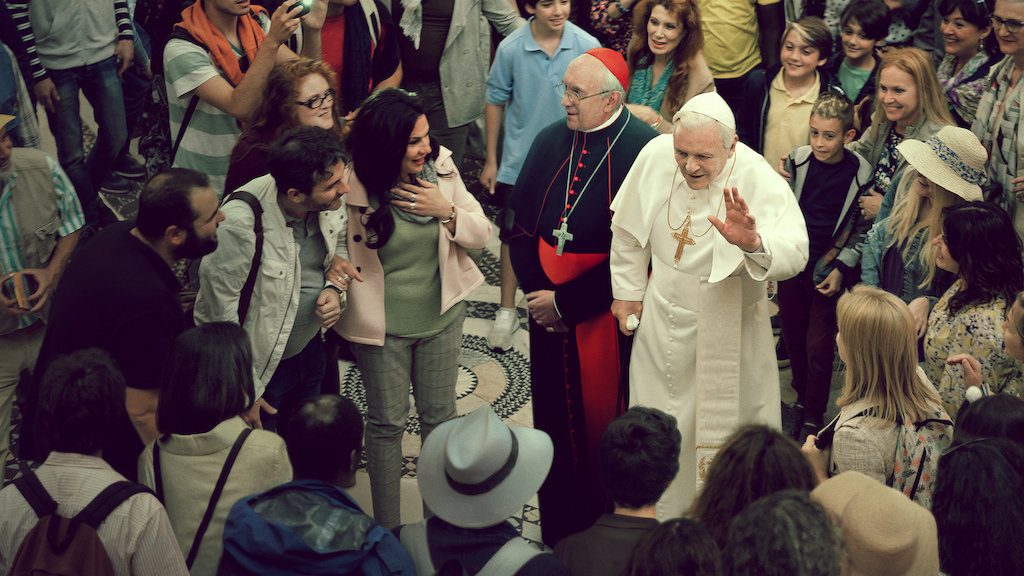
By Jacob Sahms
As a child, Fernando Meirelles watched the parodies that his father had crafted as a teenager on a projector set up in the family’s home. On screen, his uncles and his mother became characters in his father’s short films, and he yearned to make films of his own. Gifted a Super 8 camera as a teenager, he began experimenting, “playing,” as he calls it. Educated as an architect, he never imagined that his love for cinema would become his career, his profession.
Now, as the director of the award-winning films City of God and The Constant Gardener, the Brazilian is responsible for transforming Anthony McCarten’s book-turned-play into Netflix’s feature-length film The Two Popes. Directing the likes of Anthony Hopkins as Pope Benedict XVI and Jonathan Pryce as Cardinal Jorge Mario Bergoglio, Meirelles plays out the story in incredibly understated terms. It required the director to change what could have been a film mostly about simple dialogue between two men into something that is more than just its different pieces.
 “When I received the story, I knew it was an intelligent script with great dialogue but it was dry and dense,” Meirelles explained. “How could I make a film about two old men discussing philosophy and religion and make it interesting? It couldn’t be about a pope talking to a cardinal but two men who find the ability to talk about their disagreements.”
“When I received the story, I knew it was an intelligent script with great dialogue but it was dry and dense,” Meirelles explained. “How could I make a film about two old men discussing philosophy and religion and make it interesting? It couldn’t be about a pope talking to a cardinal but two men who find the ability to talk about their disagreements.”
In the fictional exchanges that McCarten created between Pope Benedict and then-Cardinal Bergoglio, the conservative Benedict and the progressive Bergoglio spar over what the church should be and what it needs to do. The lighting and music are simple, intimate; the acting is low in tone. But Meirelles scoured every story about the two men, seeking out jokes or interesting stories to show their humanity. In one instance, Bergoglio (then as Pope Francis) calls an airline company and the customer service agent hangs up on him, assuming that it’s a prank that the Pope needs to book a flight. [That’s a true story.] In another, the two men share jokes, including one about Jesuits smoking that a writer friend sent Meirelles.
But in the two priests first encounter, Bergoglio is humming ABBA’s “Dancing Queen” when Benedict (when he is Cardinal Joseph Ratzinger) comes forward to wash his hands in the bathroom. Meirelles says that there’s a joke there that no one gets as the two prepare to enter the Sistine Chapel to vote on the next pope, as he softly sings the lyrics to me: “Friday night and the lights are low/Looking out for a place to go/Where they play the right music/Getting in the swing/You come to look for a king/Anybody could be that guy.” Of course, Ratzinger was voted in but the progressive Bergoglio will later be that “everyman” voted in to become Pope Francis.
 Much of the debate between the two priests after Ratzinger’s election takes place at the Pope’s summer residence in Castel Gandolfo. A gardener himself, who raises vegetables and trees on his home estate in Brazil, Meirelles believed that setting the conversations outside in the garden made the film much more interesting. The fact that all of the food the Pope eats comes from that garden allowed to set up the juxtaposition between the traditional, high-functioning Benedict and the lower, simpler Bergoglio.
Much of the debate between the two priests after Ratzinger’s election takes place at the Pope’s summer residence in Castel Gandolfo. A gardener himself, who raises vegetables and trees on his home estate in Brazil, Meirelles believed that setting the conversations outside in the garden made the film much more interesting. The fact that all of the food the Pope eats comes from that garden allowed to set up the juxtaposition between the traditional, high-functioning Benedict and the lower, simpler Bergoglio.
While the Catholic church’s reach extends around the world from the Vatican, Meirelles’ interaction is much more personal. He calls himself a “lapsed Catholic,” having stopped attending a church since Vatican II when his parents left, and he was ten. “I became an agnostic, not who denies but who doesn’t embrace,” he explained. “I find it hard to believe God is something outside looking at me; it’s hard to pray. On the other hand, I believe in the order of our lives, of some kind of divine algorithm connecting us all together in beautiful wonder, some DNA in the very dirt that we share. There is something in my soul, in my atoms.”
Looking at the Old Testament in Genesis chapters 1 and 2, where God creates Adam out of the dirt of the ground and the breath or spirit of God, Meirelles is onto something incredibly spiritual, even if he doesn’t use the same vocabulary. He admits that making the film, and getting older, has made him ask more questions that cross theological boundaries, more areas of life that flow into the categories of faith and the spiritual.
 It’s Meirelles’ searching that leads him to a place where The Two Popes speaks to people, regardless of their belief or not. There’s certainly a message of tolerance, about listening to and learning from each other, even people who don’t see eye to eye. There’s a strong message of forgiveness, of forgiving oneself for the things done in the past and for forgiving each other. There’s a political message, as Francis is so critical of the economic system that creates inequality, and of the inequality in the Catholic church, especially when it comes to immigrants and refugees. All of these tie into the spiritual aspect that Meirelles sees flowing through the story of the two men.
It’s Meirelles’ searching that leads him to a place where The Two Popes speaks to people, regardless of their belief or not. There’s certainly a message of tolerance, about listening to and learning from each other, even people who don’t see eye to eye. There’s a strong message of forgiveness, of forgiving oneself for the things done in the past and for forgiving each other. There’s a political message, as Francis is so critical of the economic system that creates inequality, and of the inequality in the Catholic church, especially when it comes to immigrants and refugees. All of these tie into the spiritual aspect that Meirelles sees flowing through the story of the two men.
“If you believe in something, you feel connected, but at some point, when you become disconnected, you experience the dark night of the soul,” proposed the director. “But the film encourages us to keep moving, to keep going in belief knowing that the connectedness will return.”
Even as Meirelles searches out the workings of the human mind, of religion, of politics, and of relationships in his own life, his film points to the place where he might find what he’s looking for. In The Two Popes, the answer is clearly that we need to learn from each other, to open our hearts, and to actively pursue the movement of the Divine.




